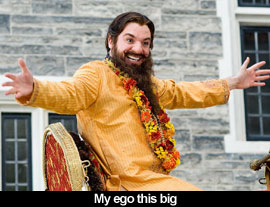THE LOVE GURU
ZERO STARS/****
starring Mike Myers, Jessica Alba, Justin Timberlake, Ben Kingsley
screenplay by Mike Myers & Graham Gordy
directed by Marco Schnabel
GET SMART
***/****
starring Steve Carell, Anne Hathaway, Dwayne Johnson, James Caan
screenplay by Tim J. Astle & Matt Ember
directed by Peter Segal
 by Walter Chaw Dick this, cock that, penis penis penis–let me mention in the interest of full, ahem, disclosure that I don't think Mike Myers is funny; that Chris Farley's death was a great shame for a lot of reasons, among the worst that his passing opened the door for Myers to voice Shrek; and that it's not amusing in the slightest to make an endless stream of johnson jokes. The Love Guru has Myers sort of taking a wave at a cheap Indian accent in a redux of that Eddie Murphy triumph Holy Man–which means, essentially, that he proves himself not as committed as Will Ferrell and not as feral as Adam Sandler and not as neutered, as it happens, as Eddie Murphy. Myers, in other words, is less than his peers, doomed to be upstaged at every turn by anyone unfortunate enough to share a scene with him. (Doomed, too, to be constantly undermined by his inability to resist mugging for the camera.) Myers is Guru Pitka, a writer of Dr. Phil-cum-Deepak Chopra self-help volumes hired by the owner of the Toronto Maple Leafs, Jane (Jessica Alba), to cure star winger Roanoke (Romany Malco) of his sudden case of the shakes. Thus Myers marries his two passions (hockey and not being funny) into one noxious ball of shit and wiener jokes, in the process taking a colossal dump on an entire culture with puerile wordplays like "Guru Satchabigknoba" and "Guru Tugginmypudha" (Ben Kingsley, playing it cross-eyed). It was funny when Monty Python did it, yes, because Monty Python was made up of people who were funny.
by Walter Chaw Dick this, cock that, penis penis penis–let me mention in the interest of full, ahem, disclosure that I don't think Mike Myers is funny; that Chris Farley's death was a great shame for a lot of reasons, among the worst that his passing opened the door for Myers to voice Shrek; and that it's not amusing in the slightest to make an endless stream of johnson jokes. The Love Guru has Myers sort of taking a wave at a cheap Indian accent in a redux of that Eddie Murphy triumph Holy Man–which means, essentially, that he proves himself not as committed as Will Ferrell and not as feral as Adam Sandler and not as neutered, as it happens, as Eddie Murphy. Myers, in other words, is less than his peers, doomed to be upstaged at every turn by anyone unfortunate enough to share a scene with him. (Doomed, too, to be constantly undermined by his inability to resist mugging for the camera.) Myers is Guru Pitka, a writer of Dr. Phil-cum-Deepak Chopra self-help volumes hired by the owner of the Toronto Maple Leafs, Jane (Jessica Alba), to cure star winger Roanoke (Romany Malco) of his sudden case of the shakes. Thus Myers marries his two passions (hockey and not being funny) into one noxious ball of shit and wiener jokes, in the process taking a colossal dump on an entire culture with puerile wordplays like "Guru Satchabigknoba" and "Guru Tugginmypudha" (Ben Kingsley, playing it cross-eyed). It was funny when Monty Python did it, yes, because Monty Python was made up of people who were funny.
